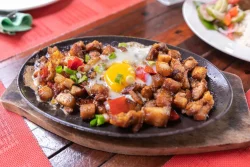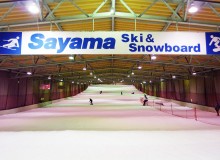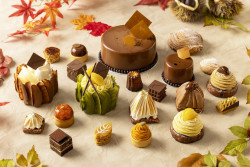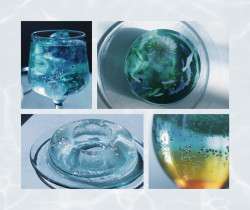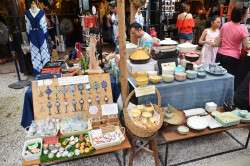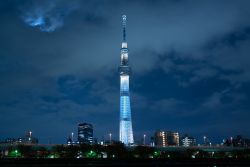
February 5, 2009
The Tricksters of Tokyo
With dozens of magic bars and a small army of illusionists, Tokyo has a whole lot of tricks up its sleeve
By Shaun Davies

Photo by Scott Larson
On another night, I’m drinking in Calvados, which is tucked away on the fifth floor of a building in the Kabukicho red-light district. One of Maya Issey’s protégés, Leo, is scheduled to appear, but the bartenders are entertaining the crowd before the show.
A young magician tapes a pair of coins to his eyes and proceeds to solve a Rubik’s Cube. Later I ask him how he does it, and he shrugs. “I memorized it,” he says.
Leo’s stage show is awash with pyrotechnics and lasers. For the climax, he brings an audience member onstage and mesmerizes her with a tissue that appears to dance through the air. He then folds the tissue into the shape of a rose before setting fire to its paper petals. The tissue quickly disintegrates, but in its place, Leo is holding a real rose, which he presents to his blushing volunteer.
In person, Leo is mild-mannered with an ironic edge. Born to Korean parents in Japan, he has a well-paid day job, but treats his alternative career as a magician seriously.
“Japan is now famous for table magic. Most magicians [here] don’t have so many opportunities to perform on a big stage, so they focus on close-up magic instead,” he says.
“Lots of different people come to magic bars, depending on the place. In Ginza, for instance, you see a lot of businessmen who’ve been out drinking, and you see people who come from hostess bars. Sometimes they bring the hostesses with them.”
Leo, like many magicians, started learning tricks as a child, and he’s now serving something of an apprenticeship with his friend Maya. His performance is not quite as slick as his mentor’s, but he’s slowly progressing through the ranks of the magicians, and performs regularly at Calvados.
Maya himself learned his first bit of magic from an uncle at age 4—a simple version of the classic “cups and balls” trick, where the magician uses three balls and three cups to create a variety of illusions. He says magicians tend to be smart and inquisitive people who are fascinated by the inner workings of a trick.
“There are a lot of scientists and doctors who love magic because they have intellectual curiosity. Those kinds of people want to discover the principle of a new trick,” he says.
But there’s also an element of hucksterism to magicians—they manipulate audiences in order to delight them, using distractions and hidden knowledge. Leo says that magicians are interested in understanding how the mind works, and how humans react in different situations.
“People who become magicians aren’t usual people. They’re interested in trying new things and they’re creative,” he says.
The global economic downturn has had an impact on Tokyo’s magic bars—Leo says he’s heard of a couple that have closed down, squeezed out as Tokyo’s workers snap their wallets shut. There’s rivalry between some venues, too.
“Some bars are allies but others are rivals. There have been cases where one magician has stolen tricks from another, or has a very similar act to someone else, and this sometimes causes fights,” Leo says.
But internal bickering aside, Tokyo’s magicians realize that the most important thing is the magic itself. At the end of Maya’s show at Conjuror’s, he makes a wooden table levitate and float over the heads of his audience. When it finally lands, he’s greeted with rapturous applause, but reacts with a just modest bow and sly grin. For him, it’s just another astonishing night at the magic bar.
If you’ve got a hankering for some sleight-of-hand, Tokyo has a glut of options—around 30 magic bars in total, plus a very special shop. The venues charge between ¥3,000 and ¥7,000 for entry, which usually includes a show and one drink. Here are five of the best.
Conjurors
Issey Maya’s bar features top-notch magicians and a slick setup.
B1, 8-5-9 Ginza, Chuo-ku (near the Nikko Hotel). Tel: 03-6254-5240. Open Mon-Fri from 8pm, closed Sat, Sun and hols. Nearest stn: Shimbashi or Ginza.
Calvados
A magic bar with a younger vibe (below), in keeping with its Shinjuku location.
5F, 1-2-13 Kabukicho, Shinjuku-ku. Tel: 03-5272-4000. Open Mon-Sat from 7:30pm, closed Sun & hols. Nearest stn: Shinjuku, east exit. www.c-group.inn/calvados
Toto’s Bar
This Ginza magic bar is run by magician Toto, who makes frequent visits to the US.
6F, 5-4-15 Ginza, Chuo-ku. Tel: 03-6253-7386. Open Mon-Sat from 7pm (showtimes 9pm, 11pm & 1am), closed Sun and hols. Nearest stn: Ginza or Yurakucho. www.toto-office.com/english/bar.html
Joker
A classy, pricey Ginza establishment featuring a polished wooden bar and magicians in bowties.
4F, 8-7-9 Ginza, Chuo-ku. Tel: 03-3571-4054. Open Mon-Fri 7pm-2am, closed Sat-Sun & hols. Nearest stn: Ginza.
Magic Land
Ton Onosaka’s lovably ramshackle magic shop is the best place to buy tricks in Tokyo.
3F, 3-5-2 Nihombashi-Kayabacho, Chuo-ku. Tel: 03-3666-4749. Open Tue-Sun 11am-6.30pm, closed Mon & hols. Nearest stn: Kayabacho. www.magicland.jp
